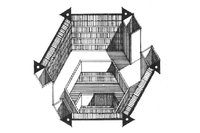Difference between revisions of "Poetry"
From Introduction to Electronic Literature
| (3 intermediate revisions by 3 users not shown) | |||
| Line 1: | Line 1: | ||
| − | Reading The Library of Babel made me reconsider everything I know about the English language and what we as humans hold as knowledge. We associate a set of arbitrary characters with specific feeling, sounds, smells, sights and meanings and, over time, develop various accepted combinations of characters that transcend the arbitrary position of language to create understanding and connection. One of the things that struck me the hardest in this piece was the idea that everything we know or will eventually come to know about our universe and our situations within in are entirely dependent on this arbitrary set of characters and how we assign [[meaning]] to them. Going further, I wonder if, without language, our world would cease to exist. While I know that it would physically remain, what's the purpose of objects and living beings if we have no ways to [[communicate our experiences]] or articulate what each of these objects is. This realization makes me consider the greater [[purpose]] of The Library of Babel, itself. What is the point of a library full of gibberish? One possible reason is to precisely maintain the arbitrary figures of a language and to organize them into every possible combination so that we may understand the past, present and future on the deepest level possible. With regard to that notion, the piece is quite possibly meant to stem our thinking out from what we know to be true to what could ever possibly be true or false, creating a tree of understanding similar to the connections between these WikiLinks. That, then, leads me back to the existential question: what is the point of knowing everything in existence if we don’t yet know the purpose of our own existence? ~LCS | + | [[File:Library of Babel.png|200px|thumb|right|modelling Library of Babel]]Reading The Library of Babel made me reconsider everything I know about the English [[language]] and what we as humans hold as knowledge. We associate a set of arbitrary characters with specific [[feeling]], sounds, smells, sights and meanings and, over time, develop various accepted combinations of characters that transcend the arbitrary position of language to create understanding and connection. One of the things that struck me the hardest in this piece was the idea that everything we know or will eventually come to know about our universe and our situations within in are entirely dependent on this arbitrary set of characters and how we assign [[meaning]] to them. Going further, I wonder if, without language, our world would cease to [[exist.]] While I know that it would physically remain, what's the purpose of objects and living beings if we have no ways to [[communicate our experiences]] or articulate what each of these objects is. This realization makes me consider the greater [[purpose]] of The Library of Babel, itself. What is the point of a library full of gibberish? One possible reason is to precisely maintain the arbitrary figures of a language and to organize them into every possible combination so that we may understand the past, present and future on the deepest level possible. With regard to that notion, the piece is quite possibly meant to stem our thinking out from what we know to be true to what could ever possibly be true or false, creating a tree of understanding similar to the connections between these WikiLinks. That, then, leads me back to the existential question: what is the point of knowing everything in existence if we don’t yet know the purpose of our own existence? ~LCS |
